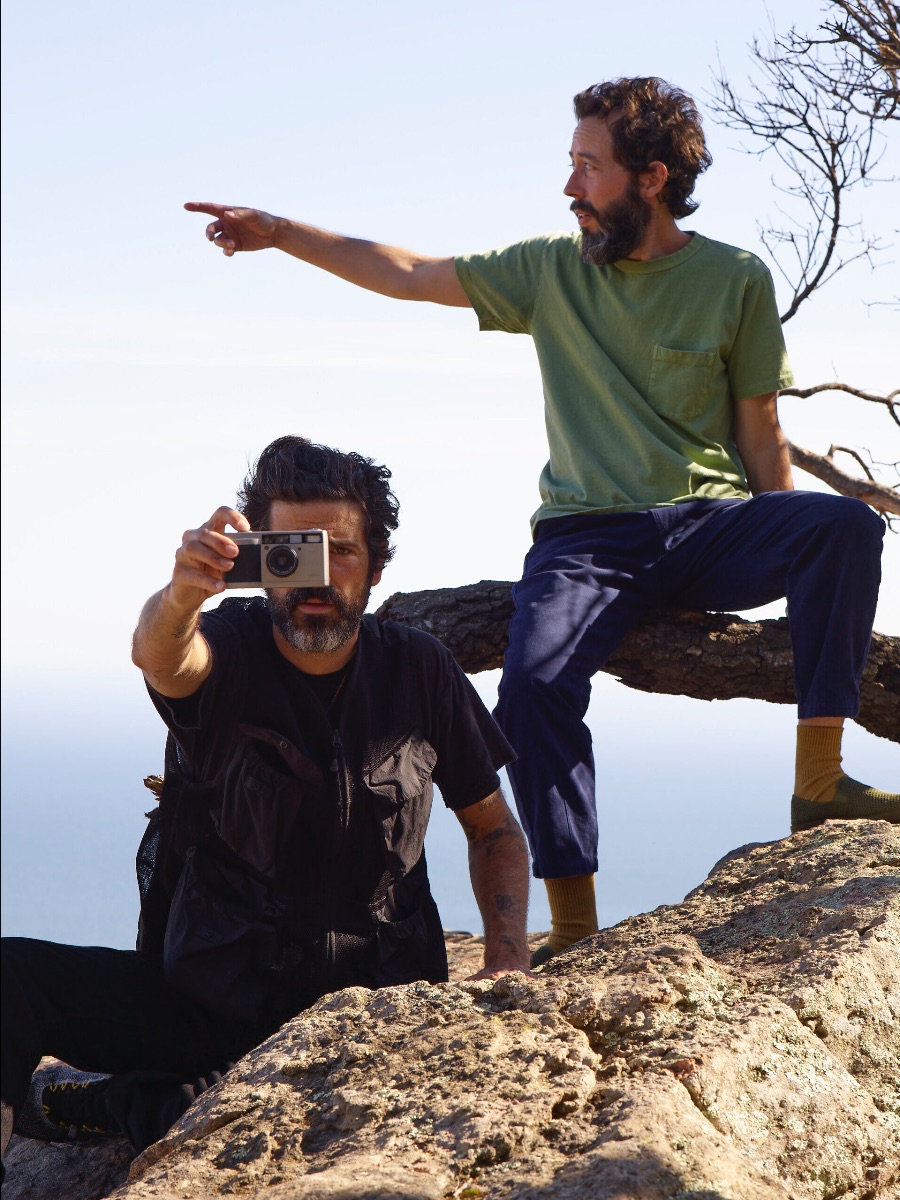THEIR first meeting may have been entirely inauspicious – the one enquiring of the other whether in fact he was, indeed, a French drug dealer – but once that initial barrier was overcome, the twin, surging talents of acid folk scion Devendra Banhart and minimalist composer and producer Noah Georgeson became firm friends; collaborators. And now they’ve unveiled a first, expansive ambient album on which they’ve receive twin billing: it’s both titled and intended as a Refuge, and we have the first two tracks to emerge from that double set, “In A Cistern” and “Into Clouds”, here for you this Sunday. Lay back, listen.
Noah and Devendra first ran into each other almost 22 years now, on Hallowe’en 1999, on San Francisco’s Castro Street – Devendra mistaking Noah’s Björn Borg fancy dress outfit as something suggesting a French drug dealer. Having established that he was not, in fact, a Gallic narcotic purveyor, the two got talking and became firm friends.
Noah had already produced seminal albums by Joanna Newsom and The Strokes, and came on board as co-producer for Devendra’s 2005 album Cripple Crow; they’ve been working together ever since.
As they got to know each other, they realised that they had a similar history in the New Age subculture of the 1980s: a world of meditation, Eastern music, the Bhagavad Gita. They shared memories of health food stores and Windham Hill Records; deeply unfashionable sounds.
“It wasn’t cool for a long time,” says Noah. “I went to grad school for music composition. Coming from an academically rigorous world, I rejected this kind of music because it’s simple, gestural music.
“It took me a while to come to a place where I was OK with that. It was not our intention to mimic these records but that New Age world is part of the musical foundation.”
And it’s that acoustic ambient aesthetic, as seen elsewhere recently with Field Works’ most recent album, Cedars, and its soon-come instrumental counterpart, which informs Refuge; Noah also cites former teacher and avant-garde legend Pauline Oliveros, whose practice of “deep listening” was also hugely influential.
It was while making Devendra’s last album, Ma, in 2019 that the pair finally decided to make their long-mooted ambient album. Work began in the spring of 2020 and then, bam, you know the rest; even though they only live a short drive away from each other in LA they were unable to meet, so they began to compose individually before beginning a rich exchange.
The pair describe the evolution of the album as “the most intimate thing we’ve done. This would be the only record we could possibly make like this.”
Inspired by shared memories of their cultural upbringing and the hugely fraught present day, they intend Refuge as an act of companionship and generosity which gives the listener room to breathe.
“We’re hoping to create a sense of comfort and coming back to the moment,” Devendra says. “It’s really important to have a little bit of space between us and our anxieties and impulses. What you do with that space is up to you.”
Now, that brace of tracks from the baker’s dozen of the whole: the first is a gentle arpeggio of harp – courtesy Mary Lattimore, of course – and warm slide guitar; a music to slip deep inside and watch your breath bubble to the surface. It’s companion for today is a starker but no less amniotic piece, full of the double-punctuation of a drum heartbeat, a synth riff wrapped in echo underpinning, and again, that ripple of slide to wash you clean.
They come twinned with a video directed by Nicky and Julianna Giraffe: a collection of meditative imagery and documentation of insects camouflaging in environments both natural and unnatural, as they journey to their own refuge; or, as Nicky Giraffe explains: “A meditative look at the life’s journey of two snails, from conception to old age, as narrated by a choir of natural imagery and other bugs.”
The album features instrumental contributions from the aforementioned harpist Mary Lattimore, Nicole Lawrence on pedal steel, Tyler Cash on piano, Todd Dahlhoff on bass, Vetiver’s Jeremy Harris on synth, while David Ralicke brings the brass and woodwind.
Devendra, who has been studying Vajrayana Buddhism for the last decade, invited contributions from spiritual teachers. Thus meditation pioneer Sharon Salzberg (“one of the people who introduced the word ‘mindfulness’ to the west”, explains Devendra) adds guidance to “Sky Burial”; Sri Mataji Shaktiananda appears on “A Cat”, and Devendra’s own Bhutanese teacher Neten Chokling Rinpoche recites a mantra at the end of “Asura Cave”, which also features field recordings of Buddhist ceremonies Devendra gathered in Nepal.
The album came together in 2020 but, says Devendra, “We’ve been talking about it for so long. It’s kind of been 20 years in the making.”
Devendra Banhart and Noah Georgeson’s Refuge will be released by Friends Of Dead Oceans digitally, on trad black 2xLP and limited seaglass wave translucent 2xLP on August 13th; there’s also some deluxe bundling options, with 350 only packed in a custom box containing a postcard pack with imagery from Refuge, Tibetan Lhasa incense and a wabi-sabi smudge bowl from Incausa, plus a Genmaicha tea blend from Shizouka, Japan, via Bellocq Tea Atelier. One hundred only will also include a hand-drawn and signed original drawing by Devendra. You can order your copy now,
here.














No Comment